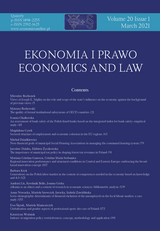The quality of formal institutional subsystems of OECD countries
The quality of formal institutional subsystems of OECD countries
Author(s): Mateusz BorkowskiSubject(s): National Economy, Economic policy, Government/Political systems, Comparative politics, Economic development, Socio-Economic Research
Published by: Wydawnictwo Naukowe Uniwersytetu Mikołaja Kopernika
Keywords: institutional economics; formal institutions; soft model; SEM–PLS;
Summary/Abstract: Motivation: Institutions are the core element of every economic system. Institutions condition all economic, social and political relations within the economy. They are universal. There is no doubt that a non-institutional analysis of contemporary economies is incomplete. The subject of this article are subsystems of formal institutions of OECD countries. This paper is an attempt to supplement contemporary economics with a structural model of formal institutional environments. Aim: The purpose of the article is to assess the quality of formal institutions of OECD economies and to identify the most important groups of institutions that shape the formal institutional environment of modern economies. A research hypothesis was adopted, stating that the quality of property rights has the strongest positive impact on the quality of formal institutional subsystems. Results: The analysis of the literature allowed the indication of the importance of (especially formal) institutions in the economy. The constructed soft model allowed for positive hypothesis verification. As it turns out, the quality of formal institutions is positively influenced by all three separate groups of formal institutions, but institutions of property rights are of the greatest importance.
Journal: Ekonomia i Prawo. Economics and Law
- Issue Year: 20/2021
- Issue No: 1
- Page Range: 21-44
- Page Count: 24
- Language: English

